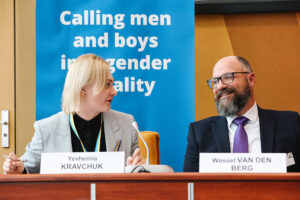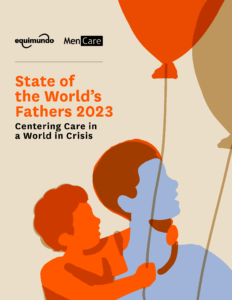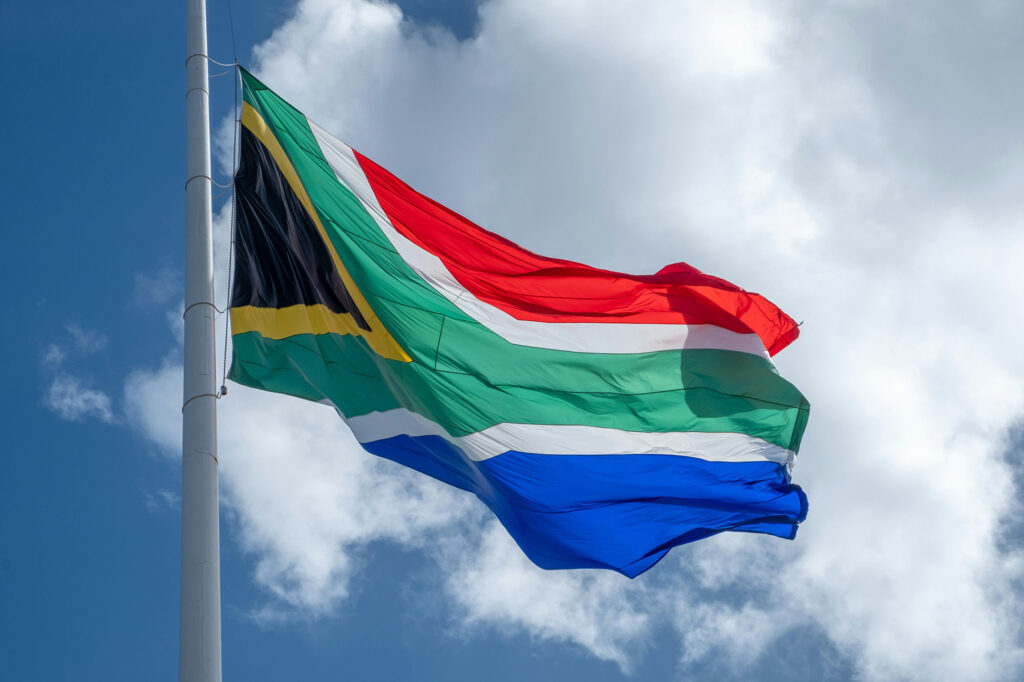
Wessel van den Berg est le responsable principal du plaidoyer chez Equimundo, soutenant les objectifs de plaidoyer d'Equimundo dans le monde entier et organisant les Campagne mondiale MenCare et Initiative mondiale pour l'enfance. Wessel, qui est basé au Cap, réfléchit aux récents changements survenus en Afrique du Sud des lois sur le congé parental qui, à première vue, peuvent sembler une victoire, mais qui pourraient encore aggraver les inégalités entre les sexes – en ne reconnaissant pas que les hommes doivent eux aussi s’en soucier.
Qu'est-ce que cela signifierait si s'absenter du travail pour s'occuper d'un nouveau-né était aussi normal pour les pères que pour les mères ? Les femmes auraient plus de liberté pour reprendre un travail rémunéré, certes. Mais plus profondément, cela changerait le cours des choses, ce qui compte le plus pour la société : la sécurité financière, ou l'attention et les liens humains.
Lorsque le soin devient la responsabilité de chacun, nous dépassons les stéréotypes de la « mère au travail » et de l'« homme soutien de famille ». Nous commençons à considérer tous les travailleurs comme des personnes qui gagnent leur vie tout en aidant. Lorsque les soins deviennent une nouvelle norme pour tous, y compris les hommes, cela modifie l’histoire que nous racontons sur la façon dont chacun devrait se comporter.
La semaine dernière, la Cour constitutionnelle d'Afrique du Sud gouverné Les lois sur le congé parental sont inconstitutionnelles. À première vue, cela ressemble à une victoire pour l'égalité. Les pères, longtemps exclus d'un véritable congé parental, bénéficient désormais d'un droit de recours. Pourtant, cette décision risque de renforcer les inégalités existantes si le Parlement n'avance pas.
Actuellement, les mères en Afrique du Sud bénéficient de quatre mois de congé de maternité payé (à 66 % du salaire), tandis que tous les autres parents – y compris les pères et les partenaires de même sexe – obtenez seulement 10 joursLa loi de 2020 qui a instauré ce dispositif constituait une amélioration : elle reconnaissait les parents adoptifs, utilisait un langage neutre et rebaptisait les 10 jours « congé parental » plutôt que « congé pour responsabilités familiales ». Mais les pères n’avaient toujours guère plus qu’un geste symbolique.
Après la décision, l'organisation du congé parental alimente encore les attentes sexistes et le présupposé fondamental selon lequel les femmes sont les dispensatrices de soins par défaut et les hommes les pourvoyeurs par défaut. Cette identification des hommes comme pourvoyeurs est fortement ancrée dans la société et apparaît constamment dans les recherches d'Equimundo comme un critère essentiel de l'identité masculine.
Equimundo Rapport sur l'état des hommes américains en 2025 Il a été constaté que 86 % des hommes estimaient qu'être pourvoyeur de ressources était synonyme de virilité : cela incluait une pression pour subvenir aux besoins financiers. Les hommes confrontés à des difficultés financières étaient plus de 16 fois plus susceptibles de déclarer des pensées suicidaires. Rapport 2023 sur l'état des pères dans le monde ont constaté que les hommes du monde entier se sentaient responsables de la prise en charge financière.
VIDÉO : Wessel parle du récent changement de loi.
C’est peut-être cette hypothèse fondamentale selon laquelle les hommes sont les soutiens de famille et les femmes les aidantes qui explique pourquoi il a fallu si longtemps pour que quelqu’un remarque qu’il y avait un problème d’inégalité en jeu en ce qui concerne les différences de congé parental pour les deux parents.
Chez Equimundo, nous savons qu'une répartition équitable du travail de soin et un investissement total des hommes dans l'économie du soin sont essentiels pour lutter contre les inégalités entre les sexes. En 2011, nous avons cofondé la campagne MenCare : une initiative mondiale promouvant l'engagement des hommes en tant que pères et aidants équitables et non violents afin de promouvoir l'égalité des sexes.
Dans le procès qui a conduit à la nouvelle décision en Afrique du Sud, le couple Van Wyk, deux professionnels à hauts revenus, a contesté la disparité des congés parentaux entre les parents. Ils ont soutenu que le père devait bénéficier d'un congé significatif afin que la mère puisse reprendre la gestion de son entreprise. Leur affaire a été portée devant la Cour constitutionnelle, qui a confirmé le principe d'égalité de traitement.
Mais la solution provisoire est insuffisante. La Cour a suggéré que les quatre mois de congé actuellement réservés aux mères puissent désormais être partagés entre les deux parents. Sur le papier, cela semble équitable : une mère pourrait prendre trois mois et le père un. En pratique, cela a peu de chances de fonctionner.
Le rapport 2023 sur l'état des pères dans le monde montre que modèles « congés partagés uniquement » Ne pas impliquer les hommes. Sans un droit non transférable – « à utiliser ou à perdre » – la plupart des pères restent au travail, tandis que les femmes continuent d'assumer à la fois les responsabilités familiales et les responsabilités rémunérées, perpétuant ainsi les stéréotypes sexistes sur le travail de soin, mis en lumière par nos travaux, qui existent partout dans le monde.

Pire encore, un modèle partagé empiète directement sur le temps précieux dont les mères ont besoin pour se remettre de l'accouchement, allaiter et tisser des liens avec leur enfant. Il considère le congé parental comme un jeu à somme nulle, opposant les besoins d'un parent à ceux de l'autre. Ce faisant, il porte atteinte aux droits des femmes, aux droits des enfants et à la raison même du congé parental : protéger la santé, nourrir l'attachement et partager les soins de manière plus équitable.
Ce modèle est particulièrement inadapté à l'Afrique du Sud. Premièrement, les femmes y sont déjà les principales soutiens de famille. Le État des Pères de l'Afrique du Sud rapport, produit par Tataokhona en partenariat avec Equimundo dans le cadre de la campagne mondiale MenCare, ont montré que les femmes assument une part bien plus importante des dépenses liées aux enfants que les hommes. Deuxièmement, la plupart des enfants ne vivent pas avec leur père biologique, en particulier dans les ménages à faibles revenus. En fait, le pourcentage d'enfants qui ne vivent pas avec leur père biologique est le niveau le plus bas jamais enregistré à un peu plus de 35 % des enfants. Attendre des parents séparés qu'ils négocient un congé partagé est irréaliste, tout comme pension alimentaire pour enfants Les négociations s'avèrent souvent ardues et peu fiables. En pratique, ce système profitera aux couples aisés vivant en concubinage comme les Van Wyk, mais sera un échec pour la grande majorité des familles.
La bonne nouvelle, c'est qu'il est encore temps de faire les choses correctement. La Cour constitutionnelle a donné au Parlement jusqu'en 2028 pour élaborer une nouvelle loi sur le congé parental. C'est un délai court, mais c'est aussi une opportunité rare.
La solution est claire. À mesure que des dispositifs de congés progressifs comme le Plateforme de congé parental MenCare montrer, un système de congé parental équitable doit garantir un congé suffisant pour les mères enceintes et allaitantes, ainsi qu'une portion protégée et non transférable pour chaque coparent, à l'instar des modèles proposés dans Allemagne, Espagne, et SuèdeUn petit nombre supplémentaire de congés partagés pourrait offrir de la flexibilité, mais il doit reposer sur des droits individuels égaux. Ce modèle protège le rétablissement des mères, garantit l'implication des pères et uniformise les conditions de travail, où les employeurs attendent de tous les parents, et pas seulement des femmes, qu'ils prennent un congé.
La décision de la Cour constitutionnelle sud-africaine est historique. Il s'agit du congé le plus généreux jamais accordé aux pères. en Afrique jusqu'à présentMais si le Parlement se contente de codifier un modèle de congé partagé, l'Afrique du Sud risque d'enraciner les inégalités sous couvert de progrès. Une véritable égalité exige davantage. Elle implique de reconnaître que les hommes aussi doivent s'occuper des autres – et que les femmes sont bien plus que de simples aidantes.
